Misdiagnosed fractures saw children put in care
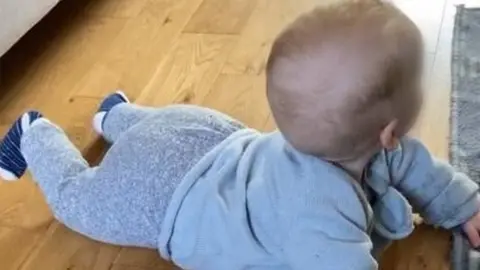 Family photo
Family photoA mother whose children were placed in care after doctors misdiagnosed fractured bones in her baby son has said she feels unable to move on from the traumatic experience.
The boys, aged eight months and three years old, were placed into foster care for eight days in October 2020.
She said being a mother, her "main identity", now felt "tainted".
Betsi Cadwaladr health board apologised but said it always strived "to act in the best interests of the child".
Mother-of-two Liz, which is not her real name, said she still struggled with anxiety, nightmares and continually reliving the ordeal in her mind.
The parents took their baby son George, also not his real name, to Wrexham Maelor Hospital on Saturday, 24 October 2020 as he looked like he was in pain after an accidental fall.
"I rushed out the room to get a vest and nappy liner," said Liz, recalling the accident.
"It literally must have been less than 10 seconds, he's rolled, because he could roll, and he's rolled off and fallen off the side of the bed."
They rushed to the hospital that evening, but staff only carried out an X-ray on his clavicle and pelvis telling his parents this was the most likely place of injury.
'Where the failings happened'
This X-ray came back clear, so he was discharged that evening and his parents were told to give him painkillers.
But his parents remained worried, so they took him to see a GP the following Monday where he was referred to Glan Clwyd Hospital, Denbighshire the same day.
X-rays were taken on the Tuesday and the right leg fracture was found. The following day radiologists carried out a full skeletal exam where four further fractures were found.
A total of five fractures were diagnosed: one in each leg and three along his right arm.
Radiologists are specialist doctors who interpret diagnostic imaging such as X-rays.
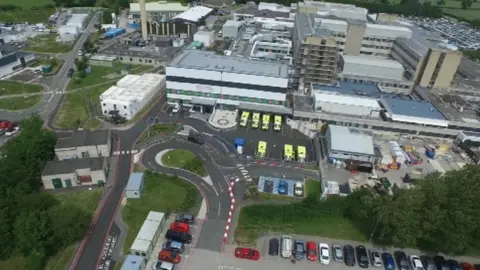
"This is the key bit, this is where the failings happened," Liz said.
"The doctor said to me that two radiologists had found these fractures. Two independent radiologists, independently of each other, had viewed these images and found these fractures."
Liz was told the existence of the fractures were "communicated as if it was certain".
"We totally trusted doctors that they would get that level of diagnosis totally correct," Liz explained.
"So we were obviously totally floored, devastated. It didn't even come into my mind that there would be a mistake."
She was told two radiologists looked at the X-rays, in line with Royal College of Radiologists guidelines.
An orthopaedic doctor raised safeguarding concerns after looking at the X-rays and the radiologists' notes.
On the Thursday, 29 October, the parents were arrested and the children taken into care.
'Horrific'
Liz said: "The police officer came over and then that was the last time I saw George [before he was returned]. I was arrested, I didn't get to say goodbye to him."
"Even at that point I thought it was all so unreal, I was taken into custody."
Just before the police interview, a social worker told Liz and her husband they had "serious concerns" for the welfare of their two sons and were asked to voluntarily place them into foster care.
"That was the worst thing to happen," Liz said.
"For this to happen to us as adults is one thing, but for the children to be taken away from their safe environment was just horrific.
"George was breast-fed so had never been away from me, so we knew it was going to be horrific."
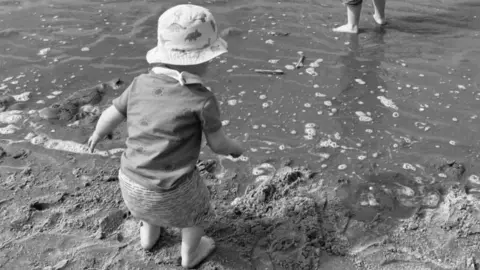 Family photo
Family photoThe boys were placed into foster care the same day.
"We were then in shock for several days, didn't sleep, didn't get dressed. We went to my parents' house because we couldn't cope on our own," added Liz.
Vindication
The X-rays were seen by Alder Hey Children's Hospital, in Liverpool, three days after the couple were arrested.
Two days later a safeguarding meeting was held where the reviewed X-rays were discussed.
The Alder Hey paediatric radiologist said only one fracture had been found in the right leg, "commonly seen due to accidental trips and falls in a mobile child", confirming George's parents' belief he had hurt his right leg by landing badly.
One on the right arm was "projectional", a visual blur on the X-ray. The one on his left leg and the other two on his right arm were due to natural bone growth.
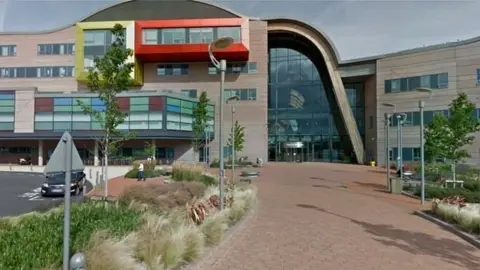 Google
Google"We knew from that moment that they had made a mistake because they're not paediatric trained, they're not specialist doctors," said Liz.
As a result, their boys were returned to their grandparents after the initial Alder Hey report having spent eight days with the foster carers.
The parents then had to wait for all the reports to come back and they were finally reunited with their children 15 days later on Friday, 13 November.
Liz and her husband have been left with overwhelming feelings of guilt.
'Distressed'
"I feel so guilty that I've not been present for a lot of the boys' lives because I've been mentally distracted," she said.
"I can't look at photo of the boys from that whole year without thinking about this.
"It's not about me, I know the boys are OK but I feel distressed at the stress they will have been put through."
It has also affected Liz's professional life.
A key worker in north Wales, she had to take six months' sick leave and change jobs within her organisation to help manage her stress.
Liz said she appreciated the "very difficult" jobs of those working in paediatric care, but said her case highlighted "a lack of competency, ability, skill set to deal with children with fractures" at Maelor and Glan Clwyd hospitals.
A year later, in October 2021, they were sent a letter from the health board describing what had happened.
There was no admission of error, despite being told over the phone the hospital had made a mistake.
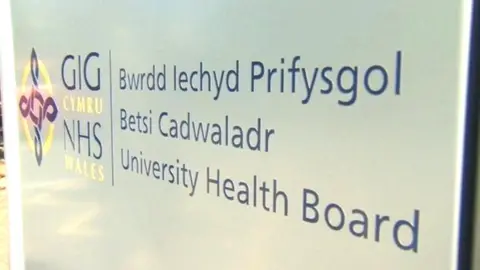
They complained to the Public Services Ombudsman for Wales.
At a meeting between the parents and the health board in December 2021, Liz said they were told 12 radiologists had looked at the X-rays and picked out one fracture on his right leg.
Liz said they still have not had an explanation for the same four errors made by two separate radiologists at Glan Clwyd hospital.
She now wants the NHS in Wales to speed up its referral process and improve its radiology services.
"Children should not be taken into care prior to consulting a person who is properly competent in this area. That's the key thing," said Liz.
"They need to be completely open about how difficult it is to interpret X-rays. They shouldn't give conclusive reports to the agencies when there are potential consequences involved."
She was told one of the radiologists would improve his report writing and paediatricians would now check agencies' understanding of medical terms.
What has the health board said?
"I would like to take this opportunity once more to apologise to the family involved in this complex and heartrending case for what they have been through," said Gill Harris, Betsi Cadwaladr University Health Board's deputy chief executive and executive director of integrated clinical services.
"I cannot begin to imagine what they had to experience. I extend my heartfelt sympathies to them.
"However our duty as a healthcare provider must always be to put children's wellbeing at the centre of what we do in such circumstances. We do this in conjunction with other agencies, who must then decide on their course of action.
"We have looked at our guidance on how we phrase reports to other agencies, so they are in no doubt when there are further clinical investigations needed.
"That being said, we again apologise for initially not spotting a fracture and the pain and distress this must have caused the child.
"This rare case has prompted us to update our policy for all occurrences of non-accidental and suspected non-accidental skeletal injuries and firmed up our processes.
"The public services ombudsman for Wales is satisfied the measures we have put in place and the remedies offered to this family are sufficient. He has decided this case does not warrant a full investigation.
"Every health board member of staff involved in this case has genuine sympathy for the trauma this family went through but we always strive to act in the best interests of the child."
However the Ombudsman has said while it did not fully investigate it suggested an early resolution. It said this approach is used when it believes something has gone wrong with public services.
It also added it made some recommendations to the health board which were:
- To send the complainant a further written response to include direct input from the radiologists to fully reflect what was said at the meeting
- The written response to include a summary of the issues followed up at peer reviews with the radiologists concerned, omitting personal information
- To make a record in the child's records to acknowledge that a mistake was made in the reporting of his X-rays regarding the diagnosis of additional fractures
